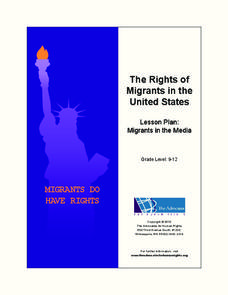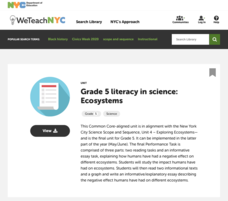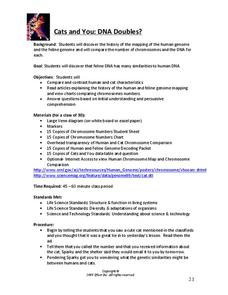Curated OER
Perspectives on Animals
Engage your class in a discussion about humane treatment of animals by recognizing the basic rights of all races, religions, classes, etc. Have volunteers stand on a milk crate without shoes until they become uncomfortable as an example...
Curated OER
People of the Stone Age: Hunters and Gatherers
Intended for a young audience, this presentation provides a simplistic view of the life of a Stone Age hunter/gatherer. Human migration, gathering, tools, and the Ice Age are covered but not in-depth. A topical discussion with good...
Bridge
Mercury - Mercury is Rising
Hold a discussion in your class about the increase in mercury being found in fish that are caught commercially as food for humans. Given a worksheet, learners then calculate how much fish a person can safely eat each month to remain...
Curated OER
Bones: Reading and Quiz
Make no bones about it- this anatomy activity is all about the human skeleton! Learners read a 2-page informational excerpt on bones and then use the information they learned to answer 9 recall questions, including 4 multiple-choice and...
Curated OER
How 'bout them bones!
After a lesson on the human skeleton, hand out a worksheet that requires learners to identify the pelvis, rib cage, skill, spine, and thigh bones. They draw a line from the name of the bone to its location on the skeleton. Tip: Instead...
Curated OER
Organ Music
Middle and high schoolers solve a riddle about the appendix, and explore the paradox surrounding this organ. They research other human body organs to create a paper model of the human body, and write riddles highlighting identifying...
Curated OER
Pesticide Watch Card
Students examine human health by identifying dangerous pesticides. In this agriculture instructional activity, students research the food production system in the United States and discuss dangers such as pesticides, chemicals and...
Curated OER
Pig Products
How do you feel about cloning? This issue is highly debated, so educate your class before they participate in a similar debate! Read a New York Times article related to the use of cloned pig organs for human transplants. Groups develop...
Curated OER
Raven Chapter 12 Guided Notes: Sexual Reproduction & Meiosis
Young biologists define reproduction vocabulary terms, answer critical-thinking questions, label a diagram of the human life cycle, and complete a chart comparing mitosis to meiosis. This is a well-balanced instructional activity. Even...
Advocates for Human Rights
Migrants in the Media
Class members examine two documents—The Universal Declaration of Human Rights and The Rights of Migrants in the United States—and then use reports in the media to assess how well the US is doing in ensuring these rights.
Amnesty International
Respect My Rights, Respect My Dignity Module Three – Sexual and Reproductive Rights Are Human Rights
Give learners the support they need to take action in their communities when it comes to sexual and reproductive rights. A resource teaches the class about global issues surrounding gender inequality, including both readings and...
Creative Visions Foundation
Video Interpretations of the UDHR
How can people better understand their rights? Scholars explore the question with the second of four installments in the Introduction to the Universal Declaration of Human Rights lesson plan series. Learners watch and write descriptions...
University of Texas
Understanding Migration
Human migration—often the result of push and pull factors—sometimes has dramatic outcomes for both those leaving their homelands and the host countries. Using a variety of case studies, learners consider those issues. Then, by completing...
New York City Department of Education
Grade 5 Literacy in Science: Ecosytems
How do humans affect ecosystems? Learners read two articles and interpret a graph to develop essays on the human impact on ecosystems. They read about human impact on tigers and manatees as a basis for their overarching papers.
Project WET Foundation
Explore Watersheds
What makes a watershed? What are the natural and human features of a watershed? How do human features affect watersheds? Where can I find my local watershed? These questions are thoroughly explained in an informative watershed interactive.
Beyond Benign
Cats and You: DNA Doubles?
What do cats and human DNA have in common? The second lesson of a series focuses on the mapping of mammal genomes. Scholars learn about the structure of DNA as they compare the chromosomes of humans and felines.
EngageNY
Readers Theater and the UDHR
Let's make connections! Using the resource, class members make connections between the Universal Declaration of Human Rights and their readers theater scripts. To finish, they complete a worksheet to evaluate the role of narration in...
Facing History and Ourselves
Kristallnacht: Decision-Making in Times of Injustice
Have you ever been singled out in a crowd before? Pupils investigate and analyze the events of the Holocaust. They dive into the life of a middle school student, as well as the diary entries of those in Kristallnacht during World War...
Creative Visions Foundation
Creating Your Own Original Interpretation of the UDHR
How can visual aids enhance understanding of a complex topic? With the third of four lessons from the Introduction to the Declaration of Human Rights (UDHR) set, scholars view illustrations online from the book We Are All Born Free and...
Council for Economic Education
The Neolithic Agricultural Revolution
What effect could one person's invention have on the human race? In the case of the Neolithic Agricultural Revolution, small improvements in farming methods led to increased food production. The human population began to boom, leading us...
Biology Junction
Cellular Structure
The human body contains more than 200 types of cells, and plants contain many other unique types of cells. While a huge variety of cells exist, they appear to have very similar structures. A detailed presentation describes the structure...
University of Southern California
Deconstructing Genocide: The Ultimate Crime Against Humanity
There are eight stages of an atrocity known as genocide, and it's important to understand how they are represented so we can fight against it in the future. As young historians watch video clips of ten Jewish Holocaust survivors'...
Advocates for Youth
What is Sexuality?
Set the record straight with a series of health-related lessons that discuss human sexuality. Over the course of 11 group and individual activities, learners discover biological, emotional, and social facts about sexuality.
Creative Visions Foundation
Visual Interpretations of the CRC
How can people better understand the human rights that are guaranteed to children around the world? Pupils attempt to answer the question with the second of two lessons explaining the Introduction to the Convention on the Rights of the...
Other popular searches
- Arts and Humanities
- Humanities and Music
- Humanities and Culture
- Art and Humanities
- Integrated Humanities
- What Are the Humanities
- Humanities Ancient Greece
- Humanities Africa
- Arts Humanities
- Arts; Humanities
- Primary Humanities
- Humanities Morality Plays























